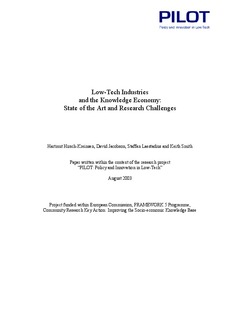| dc.description.abstract | This paper addresses a central problem for economic analysis and public policy in Europe. Should Europe focus on socalled high-technology or science-based industries in attempting to solve growth and employment problems? Or should it look to the growth prospects within the industries on which the European economy is actually based: low-technology and medium-technology industries (which we call LMT industries ) in manufacturing and services? These questions are the focus of a European Commission research project called PILOT Policy and Innovation in Low-Tech. This paper is a first output from the project it addresses key issues in understanding LMT industries, mainly in terms of knowledge intensity and use. There are many who argue that high-technology industries are the bearers of the new knowledge economy. They argue that Europe should focus on knowledge intensive activities in such frontier areas as ICT, biotechnology and professional services. A related claim is that mature, traditional or LMT industries are likely to move to less developed countries. We claim that these perspectives are seriously mistaken. Taken together, LMT activities account for somewhere in the region of 97 % of all economic activity in Europe. All European economies are trade-specialized in LMT products. All LMT industries are innovative they generate significant proportions of their sales from new and technological changed products. Many LMT industries and products are surviving and growing on the basis of technological upgrading, high-grade design skills and the intensive application of knowledge to innovation. They have unique forms of industrial organisation and knowledge creation, complex links to science and technology knowledge infrastructures, and important regional dimensions. Here we focuses on the creation and use of knowledge in LMT industries. We claim that in the future the European economy, especially in the context of enlargement, will continue to rest on LMT activities. This implies that growth, competitiveness, cohesion and employment in Europe will depend on the performance of LMT industries. At the present time, the knowledge-creation problems faced by such sectors are neglected in policy arenas but this will become a major challenge for EU innovation, technology and research policy. | nb_NO |

